Motorbiking in Vietnam: Your Ultimate Adventure Guide
Motorbiking in Vietnam is your best ticket to freedom if you have ever dreamed of starting an epic trip, flying across verdant scenery, busy towns, and isolated mountain passes. Allow MOTOGO Tours to delve into what you need know for a once-in-a-lifetime two-wheel trip.
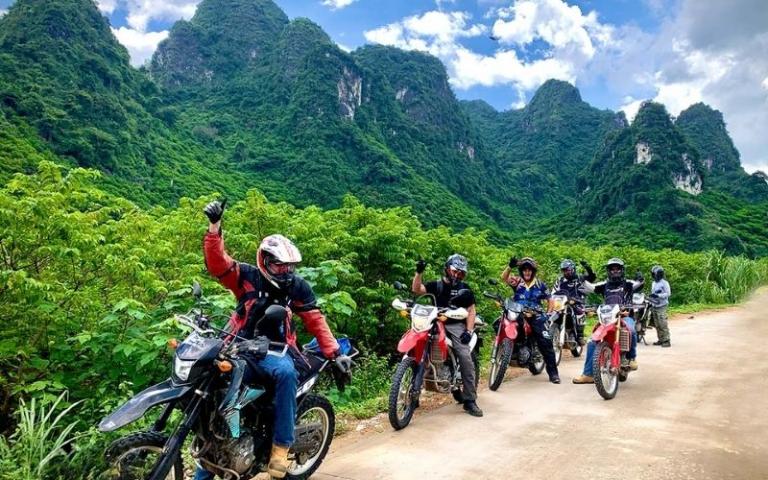
Why Vietnam is the Motorbiker’s Paradise: The Call of the Open Road
For the ultimate adventure in Vietnam, nothing beats exploring on a motorbike. Ditch buses and cramped tours, this country comes alive on two wheels. Ride through emerald rice paddies, climb misty limestone passes, and navigate bustling city streets. Motorbiking in Vietnam offers freedom, stunning scenery, and a raw connection to local life. Get ready for an unforgettable journey!
The Motorbike as the Nation’s Lifeblood: Infrastructure Built for Two Wheels
In Vietnam, a motorbike isn’t just a hobby, it’s the lifeblood of daily life. Roads, even in remote villages, are built for two wheels. Flat tire on a mountain pass? No worries, makeshift roadside mechanics are everywhere, ready to fix it in minutes. Fuel stops are just as common, even in tiny hamlets. This ease of access makes long journeys stress-free and truly enjoyable.
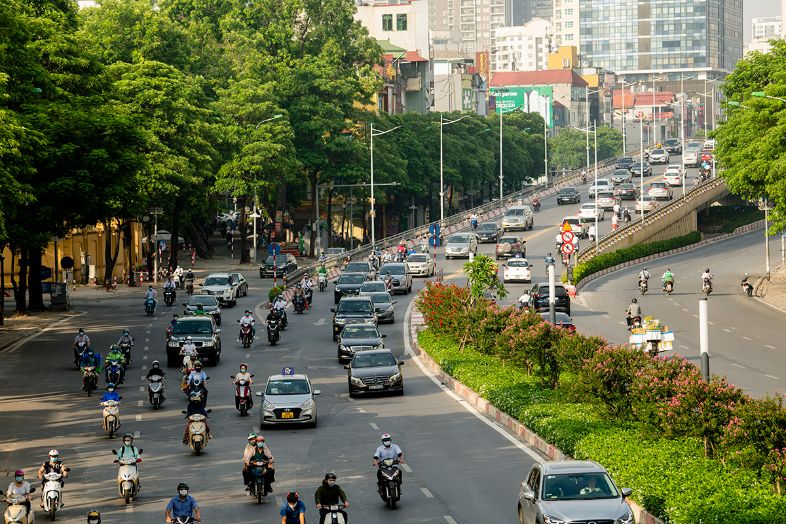
A Geographical Kaleidoscope: From Peaks to Delta in a Single Trip
Only on a motorbike can you truly experience Vietnam’s stunning geographical diversity. Begin in the Northern mountains, climbing through cloud-scraping limestone karsts and vibrant terraced rice fields in places like Ha Giang and Cao Bang, where the air is cool and misty.
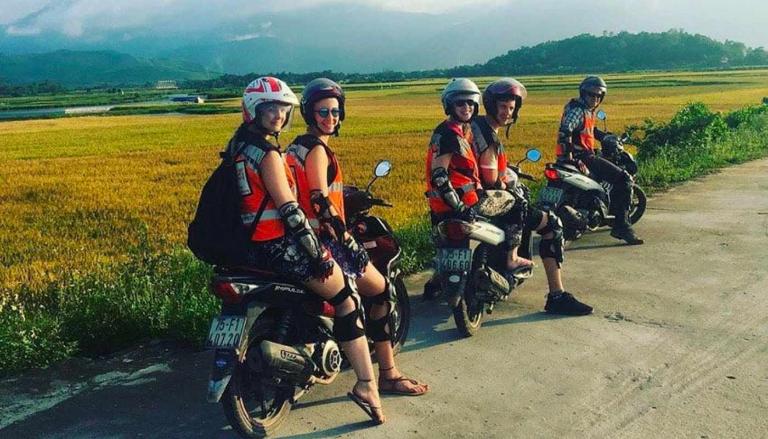
The Freedom of the Detour: Escaping the Tourist Bubble
The true magic of motorbiking in Vietnam lies in the freedom to explore off the beaten path. You’re not bound by strict itineraries or crowded tourist routes. With a motorbike, you can easily veer onto quiet village roads, past stilt houses, or follow hidden trails into the mountains. Every turn offers the possibility of discovering secluded waterfalls, untouched landscapes, and secret local spots that most travelers never see.
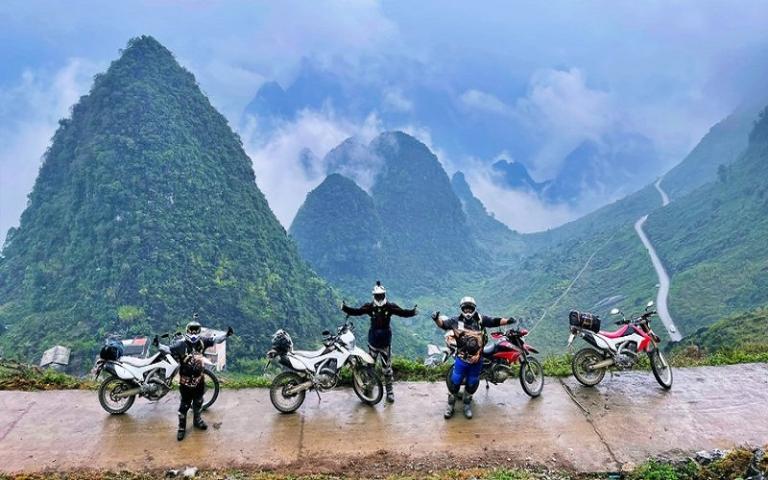
These spontaneous rides reveal Vietnam’s authentic side. Away from busy cities, life slows down, showing local culture in its purest form. On the road, you’re not just visiting, you’re living the country.
Sensory Overload and Cultural Intimacy: Beyond the Window Glass
The motorbike is the ultimate bridge to Vietnam’s culture. Unlike a tour bus, it strips away barriers, letting you breathe, hear, and smell everything around you. The scent of roasting coffee, fresh earth after a monsoon, the clang of a bicycle bell, or a child’s wave—all hit you directly. You feel the wind, the road vibrations, and the changing temperatures as you ride.
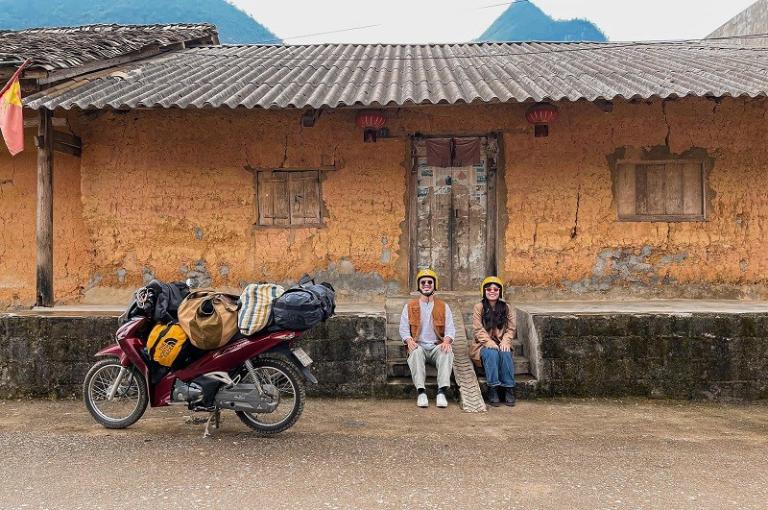
It also connects you with locals. A quick stop at a roadside stall can spark lively, genuine interactions—an immersion no bus or car can match.
Affordable Travel Option
Traveling on a budget? One of the most reasonably priced methods to see Vietnam is motorbiking. Renting a motorbike is cheap; daily rates go between $10 and $15. Fuel is cheap, and little roadside restaurants and tiny guesthouses are both pleasant and reasonably priced. For budget-conscious travellers and backpackers, motorbiking is therefore a perfect option.
Essential Routes for Motorbikers in Vietnam
Motorbike aficionados find Vietnam a wonderful location with its varied scenery. There are many amazing paths to discover from calm seaside roads to twisting mountain passes. Each of the most famous motorbiking paths in Vietnam provides a different mix of challenges, landscape, and cultural encounters; here is a comprehensive view of several of them.
Ha Giang Loop
The Ha Giang Loop is considered Vietnam’s ultimate motorbiking adventure. This route, deep in the far north, winds through dramatic mountains, limestone karsts, and lush valleys. Along the way, you’ll pass small, timeless villages where life has barely changed over decades. A highlight is the Dong Van Karst Plateau, a UNESCO Global Geopark, with its stunning cliffs and ancient landscapes.
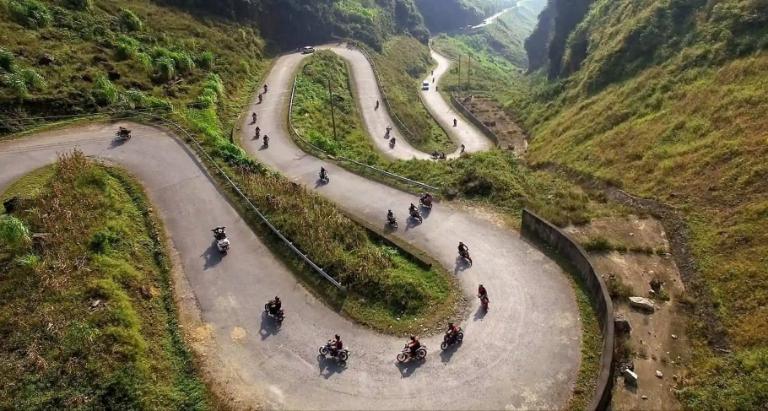
Ha Giang motorbike tours let you experience this epic landscape up close. The region’s isolation, stunning scenery, and rich cultural tapestry including H’mong and Tay minority villages, make it a true adventure. The route demands respect, with tight corners, steep climbs, and rough surfaces at times. Plan at least three to four days to fully appreciate this masterpiece.
Sapa to Lai Chau via the Sin Ho Loop
Starting from the quaint hill town of Sapa, the Sin Ho Loop takes riders through some of northern Vietnam’s most breathtaking landscapes. The route is famed for mist-shrouded mountain peaks, sweeping terraced rice fields, and lush valleys. Along the way, you’ll pass the vibrant village of Sin Ho, known for its lively weekly markets where ethnic communities gather, creating a colorful cultural snapshot.
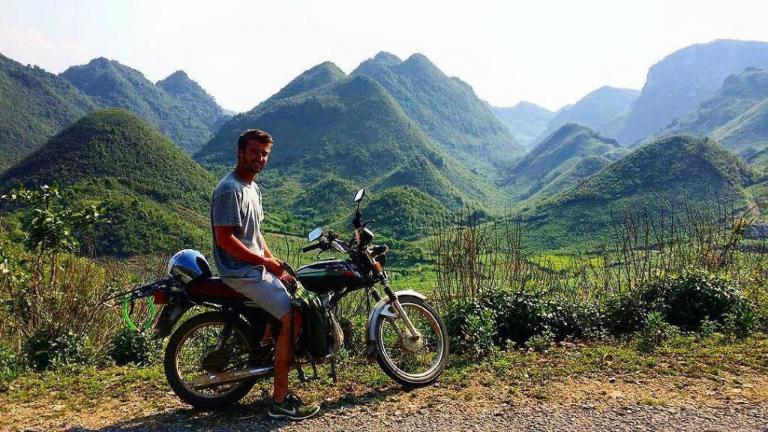
The loop also leads to Phong Tho, a serene town embraced by mountains and rivers, perfect for a quiet pause. While the roads can be winding and foggy, the journey offers an unmatched blend of cultural immersion and natural beauty. For motorbike enthusiasts seeking both adventure and authentic local experiences, the Sin Ho Loop is a rewarding ride.
Ho Chi Minh Trail
The Ho Chi Minh Trail is one of Vietnam’s most iconic motorbiking routes, stretching all the way from Hanoi in the north to Ho Chi Minh City in the south. The trail winds through tranquil rural villages, dense rainforests, and sites steeped in heritage.
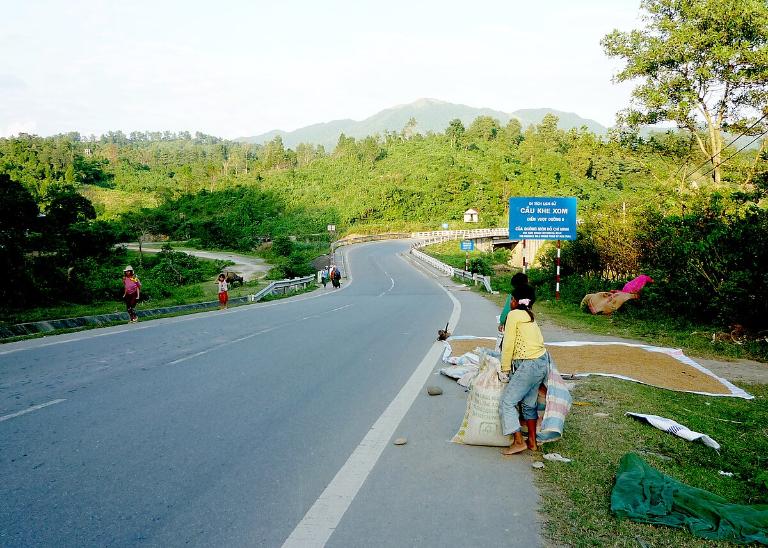
Along the journey, notable stops include Phong Nha-Ke Bang National Park, famous for its awe-inspiring caves, and Khe Sanh Combat Base, a poignant reminder of Vietnam’s past. With well-maintained roads and scenery that shifts from lush greenery to historical landmarks, the Ho Chi Minh Trail offers a perfect blend of adventure, culture, and natural beauty for riders of all levels.
Coastal Route: Hue to Hoi An via the Hai Van Pass
The Hue to Hoi An route is a must for motorbike enthusiasts who love coastal views. The journey takes you along the legendary Hai Van Pass, also known as the “Ocean Cloud Pass.” This twisting mountain road offers smooth curves, panoramic vistas of the South China Sea, and dramatic cliffs. Riders can stop in Da Nang for a beach break or explore the Marble Mountains before continuing toward Hoi An.
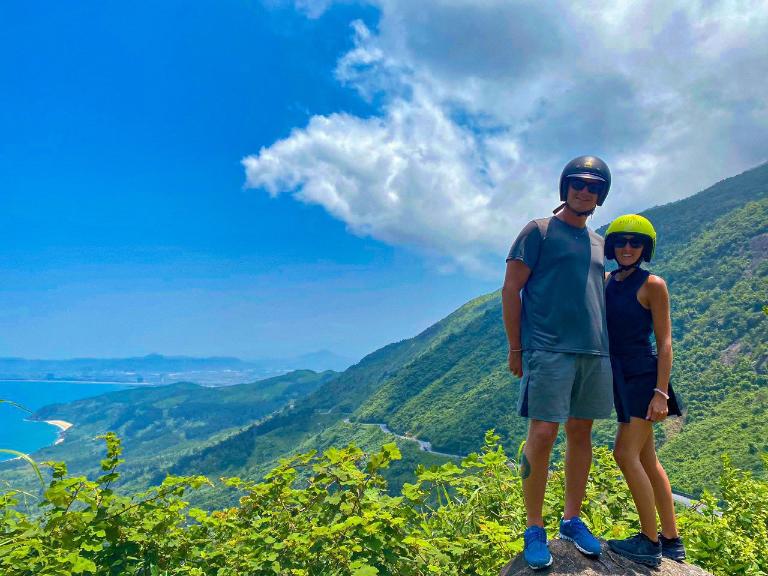
The 21km Hai Van Pass, climbing nearly 500 meters, links Hue and Da Nang with breathtaking ocean and mountain views. Thanks to the new tunnel, truck traffic avoids the pass, making it a peaceful ride ideal for all skill levels. Ending in Hoi An, a UNESCO World Heritage Site, riders can enjoy lantern-lit streets, vibrant markets, and ancient architecture. This Central Vietnam route is perfect for a half-day adventure combining natural beauty and cultural experiences.
Dalat to Nha Trang
Starting in Dalat, the “City of Eternal Spring,” riders ascend scenic mountain passes like Hon Giao, passing pine forests and cascading waterfalls. The cool highlands offer a peaceful escape with stunning views at every turn.
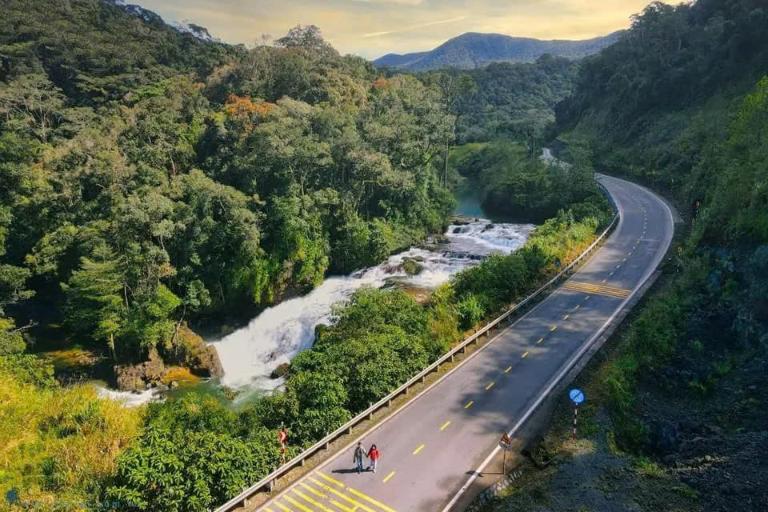
As you descend toward Nha Trang, the landscape transforms into coastal lowlands with sandy beaches and turquoise waters. This route is a favorite for its dramatic change in scenery and climate, combining the serenity of the hills with the energy of a bustling coastal city. Twisting roads and sweeping valleys make it both a thrilling ride and a perfect transition from highlands to tropical coast.
The Mekong Delta
Mekong Delta offers a unique motorbiking experience, blending leisure with cultural immersion. Known as Vietnam’s “Rice Bowl,” this region is a labyrinth of rivers, canals, and lush rice paddies. Riders can explore quiet rural roads, small river towns, and coconut-lined lanes.
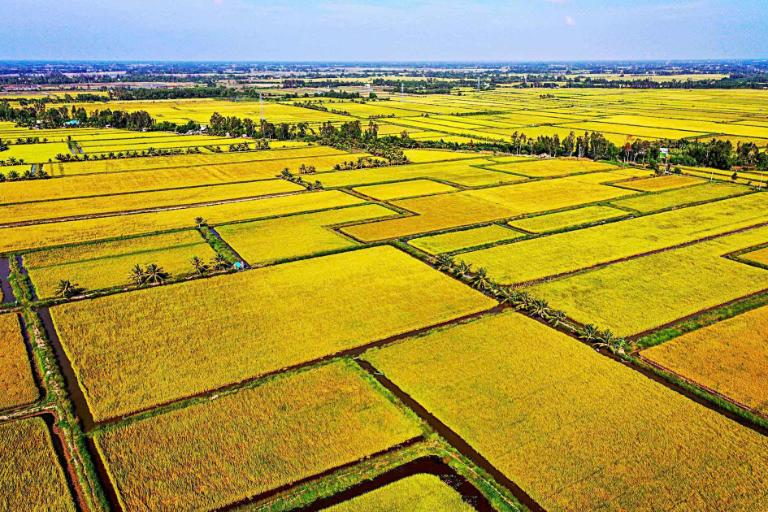
Floating markets like Cai Rang bring the region to life, where vendors sell local delicacies, fresh produce, and handicrafts. The flat terrain and gentle pace make this route perfect for beginners. Along the way, you’ll encounter warm hospitality, peaceful villages, and an intimate glimpse of rural Vietnamese life.
The Limestone Loop (Mai Chau to Pu Luong)
Limestone Loop is a hidden gem. Starting in Mai Chau, famous for its scenic valley and stilt-house villages, the route winds through Pu Luong Nature Reserve. Along the way, riders will pass terraced rice fields, limestone peaks, and hidden caves.
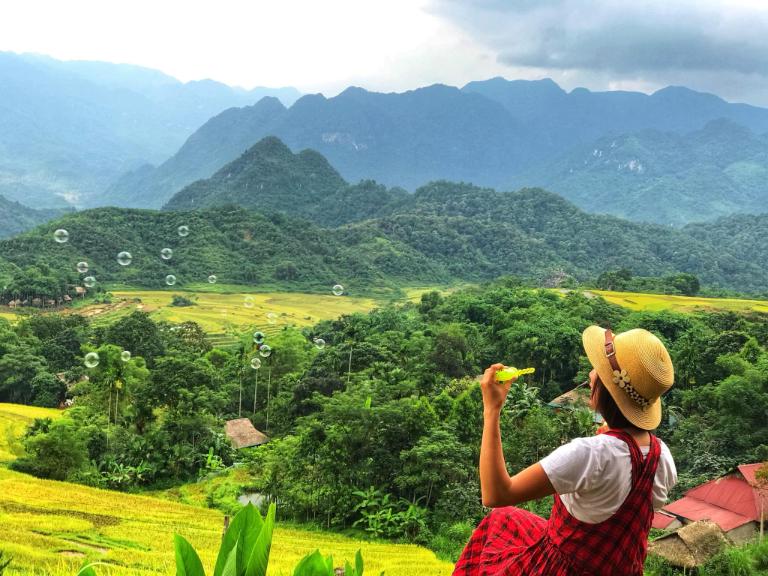
The Thai and Muong ethnic communities offer delicious local cuisine and welcoming homestays. The roads are manageable for riders of all levels, making this a perfect journey for those seeking serenity, untouched landscapes, and an authentic connection to Vietnam’s countryside.
Ca Na to Phan Rang
The Ca Na to Phan Rang route highlights Vietnam’s lesser-known coastal desert landscapes. This route contrasts sharply with the country’s lush greenery, taking riders through dry plains, expansive salt fields, and historic Cham towers.
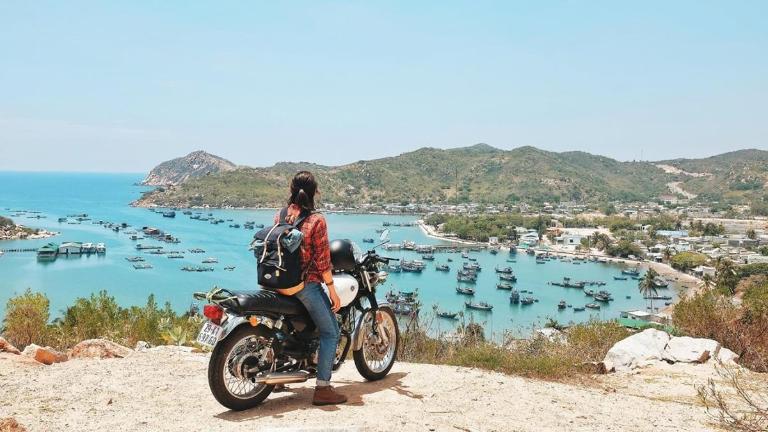
The Po Klong Garai Cham Towers are a standout attraction, offering a glimpse into Vietnam’s ancient Cham culture. This unique ride combines history, rugged coastal scenery, and adventure, ideal for motorbike enthusiasts looking to explore Vietnam beyond the usual tourist paths.
Getting Started: Pre-Trip Essentials and Preparation
Before the wind even touches your face, you have to untangle the legal knots. It’s crucial to ensure you’re compliant, as Vietnam’s traffic regulations and requirements can differ significantly from those in your own nation. Ignoring these formalities is like riding without a helmet you might get away with it, but the consequences, should anything go wrong, can be devastating.
Getting the Necessary Paperwork: Navigating the Legal Landscape
You have to figure all the legal formalities before you start your trip. It’s important to make sure you’re complying as Vietnam’s traffic rules could differ from those in your own nation.
- Driver’s License: To ride a motorbike over 50cc in Vietnam, you need an International Driving Permit (IDP) for motorcycles, along with your home country license. Riding without it can lead to fines, bike confiscation, or legal trouble. Always carry both documents.
- Insurance: Get a travel insurance policy that explicitly covers motorbiking. Check it covers medical costs, third-party liability, and ideally bike damage or theft. Without this, even a minor accident can become a major financial burden.
- Motorbike Rental Agreement: If renting, keep a clear agreement listing the bike’s condition. If buying or renting privately, always get the registration certificate to prove the bike is legal. You’ll need it at checkpoints and for any resale.
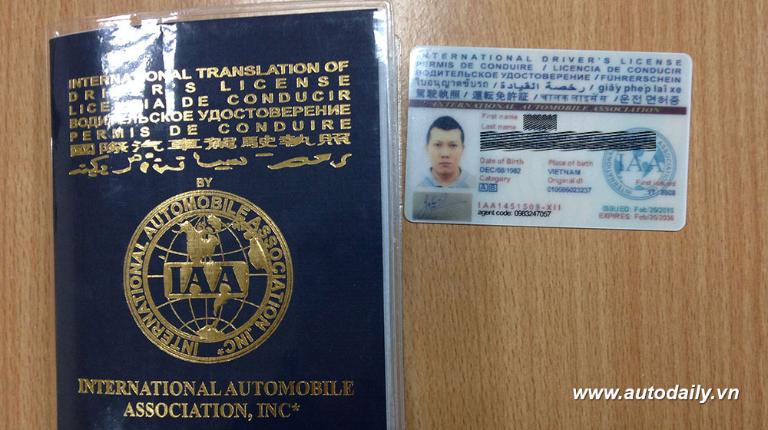
Choosing Your Steed: Finding the Perfect Two-Wheeled Partner
The kind of motorbike you decide upon will drastically influence your ride’s comfort, safety, and capability. Are you planning on hugging the coast or scaling the mountains? These elements must guide your choice of ride.
- Bike Type: For most visitors, Vietnam’s roads call for a semi-automatic or totally automated 110cc–125cc bike. For additional control on hilltop terrain, experienced riders could use a manual bike.
- Condition Check: Before you sign a rental agreement, give the bike close inspection. Examining the brakes, tires, lights, horn, and engine performance is Not hesitate to ask for a test ride to make sure everything seems correct.
- Rental Shop Reputation: Select a respectable rental company with stellar evaluations. Well-known stores can offer more straightforward service and better-kept motorcycles.
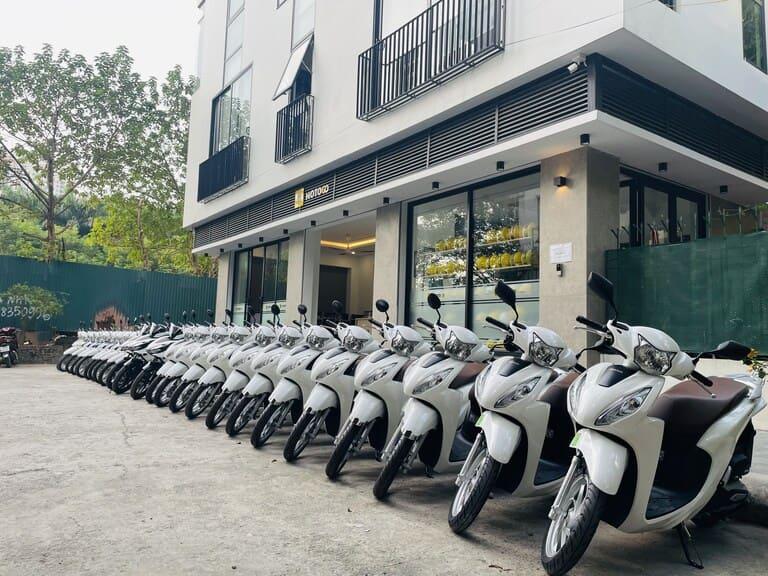
Packing Essentials for Motorbiking in Vietnam Trip: Smart Not Heavy
A hassle-free journey is dependent on packing light and packing smart. Remember, everything you bring is going to be strapped onto the back of a small metal machine for weeks.
- Protective Gear: A strong helmet is a must for safety and legal reasons. For rough terrain, consider extra protection like gloves, knee pads, and a sturdy riding jacket.
- Clothing: Wear light, breathable clothes for hot days. Pack waterproof gear for sudden rain. If visiting areas with varying climates, like northern mountains, layering is essential.
- Navigation Tools: Bring a phone with offline maps (Google Maps, Maps.me). Use a handlebar mount to keep your hands free and stay on track.
- Basic Tools and Spare Parts: Carry a small toolkit—pliers, screwdrivers, duct tape. In remote areas, extra items like spark plugs or a tire repair kit can be lifesavers.
- First Aid Kit: Include bandages, antiseptic wipes, medicines, and any personal prescriptions. It’s always smart to be ready for minor injuries or illnesses on the road.
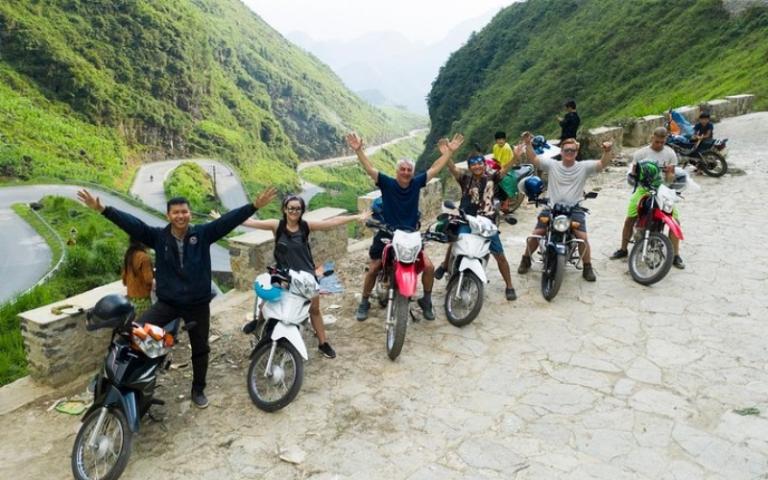
Planning Your Route: Flexibility is the Key to Joy
From dramatic coastal roads to challenging mountainous loops, Vietnam presents a wide, wonderful variety of motorbiking routes. Your experience can be much enhanced by forward planning, but remember: the best travel memories are often unplanned.
- Research and Mapping: Check road conditions, weather, and key stops before you ride. Use blogs, vlogs, and forums for firsthand tips. Mark gas stations, lodging, and restaurants especially in remote areas where services are sparse.
- Maintaining a Flexible Schedule: Plan, but stay flexible. Don’t book every night. Weather, road closures, or unexpected villages may invite you to linger. The joy of motorbiking is discovering hidden gems at your own pace.
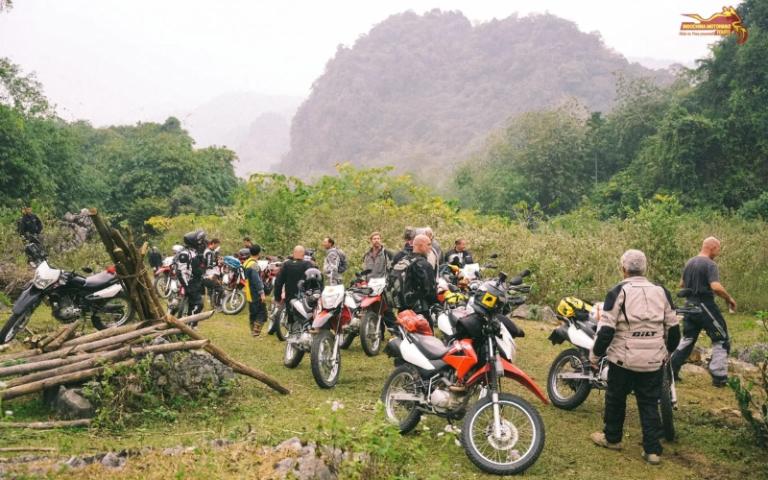
>>> Explore: Tips for Riding Downhill on a Scooter – Master Safe Techniques
Tips for a Safe and Enjoyable Ride
Starting a motorbiking journey in Vietnam is exciting, but always safety should foremost. These basic pointers will help you to maximize your road experience while guaranteeing a safe and pleasant trip.
Know Your Skill Level and Choose Your Battlefield Wisely
Before you twist the throttle and head down the road, you must honestly assess your motorbiking ability. Vietnam’s roads range wildly from the pleasant, level stretches of highway to utterly punishing, rocky mountain slopes.
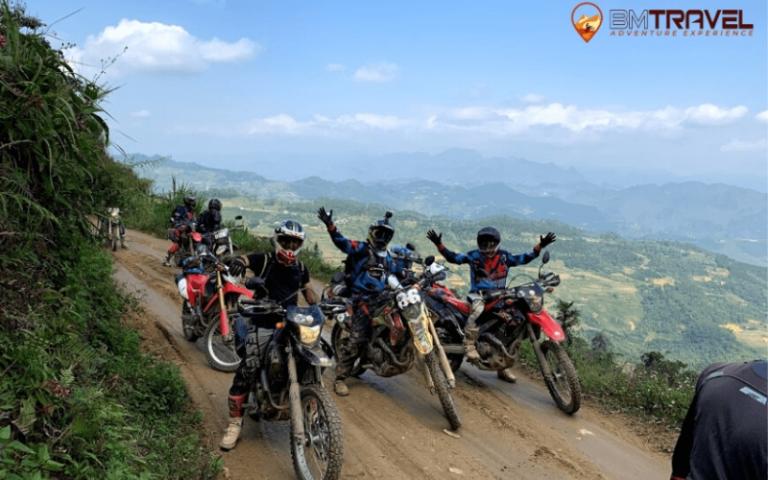
- Starting simple: If you’re a novice or haven’t ridden a geared bike in years, start with simpler, well-paved paths. This allows you to acclimatize to the local riding style without the added pressure of steep inclines and sharp switchbacks. You need to feel comfortable with the bike before you tackle the serious mountain passes.
- Respecting the Peaks: While more experienced riders can handle demanding courses, even seasoned pros should approach steep ascents and hairpin corners with extreme caution. Braking correctly on steep declines is a key skill; utilize your engine braking (downshifting) to save your friction brakes from overheating and failing.
Renting Reliability: Your Bike is Your Lifeline
Your motorbike is the single most critical element of your trip. Don’t be tempted by the cheapest option, your safety depends on a well-maintained machine. Select a respected rental provider and perform a careful inspection before handing over any money. Thoroughly check for:
- Tires: Proper tire pressure and deep tread condition (bald tires are a no-go, especially in the rain).
- Brakes: Working brakes (front disc and rear drum) that respond smoothly, not mushy.
- Lights & Horn: Functional headlight, brake light, turn signals, and a loud horn.
- Engine & Chain: A well-maintained, clean chain and a smooth-running engine without strange knocking noises.
- Test Ride: Always demand a test ride. If something feels odd, rattles excessively, or seems suspect, do not hesitate to ask for a substitute bike.
Prioritizing Gear and Learning Basics: Self-Reliance on the Road
A high-quality, DOT-certified, full-face or modular helmet is non-negotiable it saves lives. In case of falls or slides, long sleeves, tough jeans or reinforced pants, durable riding gloves, and strong boots will guard you against nasty road rash. Particularly in the rapidly changing weather, lightweight, packable rain gear is also absolutely essential to stay dry and warm.
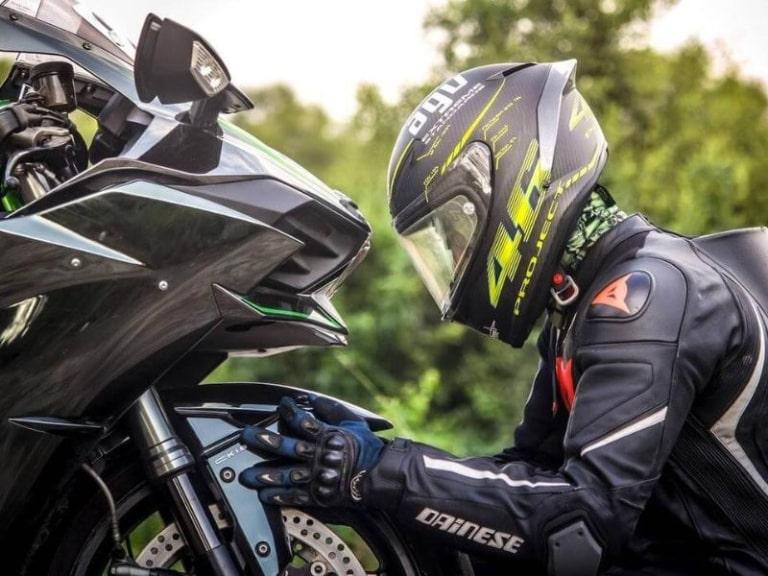
Basic Maintenance and Roadside Repairs
Knowing how to approach small bike repairs is genuinely helpful, especially when traversing remote areas. Educate yourself on:
- Changing a flat tire or using a patch kit.
- Adjusting the clutch or brakes.
- Identifying engine overheating. Carry a simple toolkit (adjustable wrench, pliers, duct tape) and a backup fuel bottle, especially on rural paths where services can be few and far between.
Follow Traffic Rules
Particularly in locations like Ho Chi Minh City or Hanoi, Vietnamese traffic may be disorganizing. Keep cool and use these pointers:
- Ride on the right-hand side.
- Always use turn signals and horn to communicate with other drivers.
- Yield to larger vehicles, as the road hierarchy often favors buses and trucks.
Although rural locations are less packed, be alert for unanticipated dangers include potholes or roving animals.
Keeping Your Documents in Order: Prepared for Checkpoints
Before you ride, double-check that you have the required documentation organized and accessible. Always carry these papers with you:
- A current International Driving Permit (IDP) featuring motorcycle endorsements.
- The bike’s registration information.
- Proof of your personal travel insurance (confirming motorbike accident coverage).
Police roadblocks are somewhat common in some places, and having your paperwork readily available will ensure a quick and stress-free passage. Keep digital copies backed up, but always carry the originals.
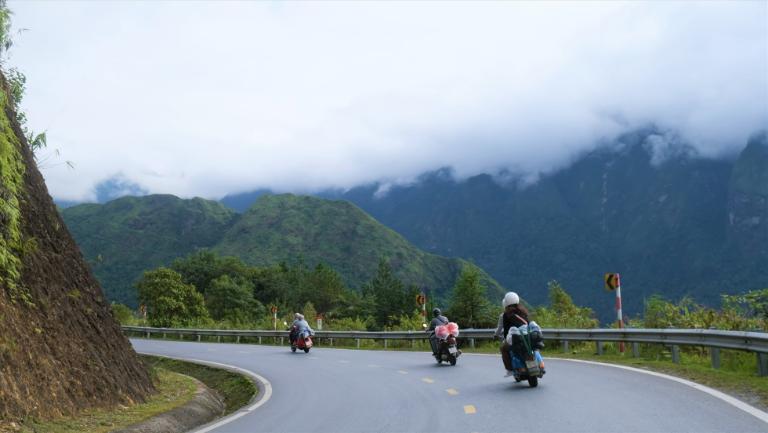
Motorbiking in Vietnam is more than just a way to get around, it’s an adventure that transforms how you see the country. Each twist and turn unveils stunning landscapes, hidden villages, and the warmth of local hospitality. From beginners to seasoned riders, Vietnam offers unforgettable routes and experiences that leave every journey etched in memory.
Related Posts:
- Tips to Travel Vietnam by Motorbike Safely: Essential Safety Advice
- Safe Motorcycle Braking Techniques: The Ultimate Guide
- Tips for Motorbike Riding in the Mountains
- Proper Cornering Technique for Safer Driving
- Road Rules for Motorbiking in Vietnam You Should Know






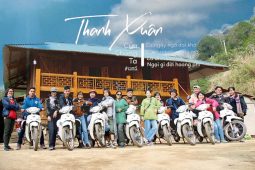
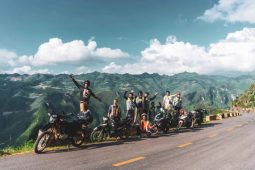
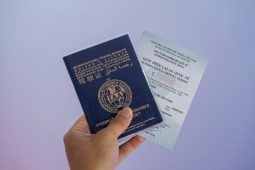
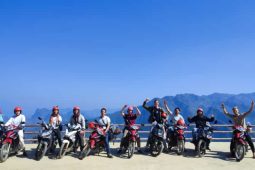
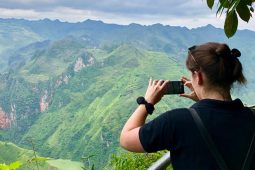
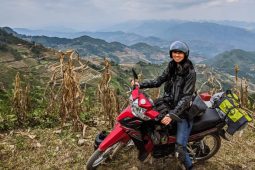

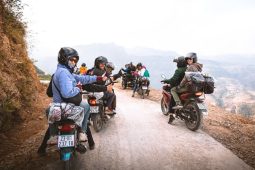
Be the first to comment!